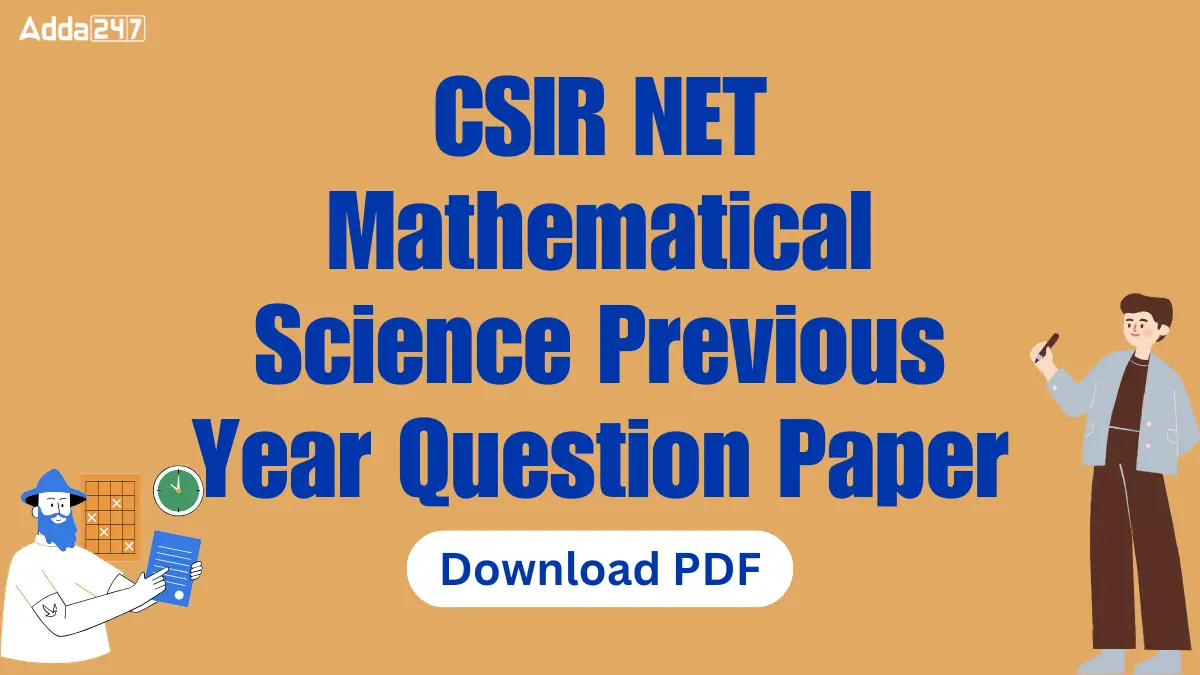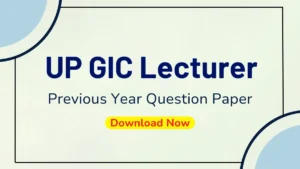Table of Contents
CSIR NET Mathematical Science Examination Date will be released soon. Reviewing CSIR NET Mathematical Science Previous Year Question Papers is an essential resource in this process, providing valuable insights into the exam’s format, common question types, and difficulty level. By solving these papers, candidates can better understand the areas frequently tested, refine their problem-solving skills, and develop effective time-management techniques, ultimately enhancing their confidence and exam readiness.
CSIR NET Mathematical Science Previous Year Question Papers
The CSIR NET Mathematical Science Previous Year Question Papers are an essential tool for candidates aiming to excel in the CSIR NET Exam. These papers offer a clear understanding of the exam structure, highlighting commonly tested topics and the level of difficulty. Practising CSIR NET Mathematical Science Previous Year Question Papers regularly can significantly improve problem-solving skills, help manage time effectively, and increase accuracy, all of which are crucial for success.
The CSIR NET Mathematical Science Exam is divided into three parts: Part A, covering General Science, Quantitative Reasoning, and Research Aptitude; Part B, focusing on core topics in Mathematical Science; and Part C, which consists of advanced application-based questions. By solving previous year’s papers, candidates can build their confidence and develop a strategy for approaching each section of the exam efficiently.
CSIR NET Mathematical Science Exam Pattern
The CSIR NET Mathematical Science exam follows a structured pattern designed to test candidates’ knowledge and problem-solving abilities across various aspects of mathematics. The exam is divided into three parts: Part A, Part B, and Part C, each with its specific focus and weightage.
| Part | Description | Number of Questions | Marks per Question | Total Marks | Questions to Attempt |
| Part A | General Science, Quantitative Reasoning & Research Aptitude | 20 questions | 2 marks | 30 marks | 15 questions |
| Part B | Core Mathematical Science topics | 40 questions | 2 marks | 70 marks | 35 questions |
| Part C | Advanced Application-Based Questions | 60 questions | 4 marks | 100 marks | 25 questions |
| Total Questions | 75 Questions | ||||
| Total Marks | 200 Marks | ||||
| Negative Marking | 0.25% for each incorrect answer | ||||
CSIR NET Mathematical Science Previous Year Question Paper PDF
Practising CSIR NET Mathematical Science Previous Year Question Papers can significantly enhance your preparation by providing insight into the exam format and frequently tested topics. It helps you adapt to the exam’s structure and build a focused approach for each section. Below, you can download the CSIR NET Mathematical Science Previous Year Question Paper PDFs for further practice:
| CSIR NET Mathematical Science Previous Year Question Paper PDF | |||
| CSIR NET Year Wise Mathematical Science Previous Year Question Paper | Set A | Set B | Set C |
| CSIR NET Mathematical Science Previous Year Paper Dec 2023 | Download PDF | ||
| CSIR NET Mathematical Science Previous Year Paper June 2023 | Download PDF | ||
| CSIR NET Mathematical Science Previous Year Paper 2022 | Download PDF | ||
| CSIR NET Mathematical Science Previous Year Paper 2020 | Download PDF | ||
| CSIR NET Mathematical Science Previous Year Paper 2019 | Download PDF | Download PDF | Download PDF |
| CSIR NET Mathematical Science Previous Year Paper Dec 2018 | Download PDF | Download PDF | Download PDF |
| CSIR NET Mathematical Science Previous Year Paper June 2018 | Download PDF | Download PDF | Download PDF |
| CSIR NET Mathematical Science Previous Year Paper Dec 2017 | Download PDF | Download PDF | Download PDF |
| CSIR NET Mathematical Science Previous Year Paper June 2017 | Download PDF | Download PDF | Download PDF |
| CSIR NET Mathematical Science Previous Year Paper Dec 2016 | Download PDF | Download PDF | Download PDF |
| CSIR NET Mathematical Science Previous Year Paper June 2016 | Download PDF | – | Download PDF |
| CSIR NET Mathematical Science Previous Year Paper Dec 2015 | Download PDF | Download PDF | Download PDF |
| CSIR NET Mathematical Science Previous Year Paper June 2015 | Download PDF | Download PDF | Download PDF |
How to Use CSIR NET Mathematical Science Last Year Question Papers?
The CSIR NET Mathematical Science exam tests both depth of knowledge and strategic problem-solving skills. Among the most powerful preparation tools are previous year question papers, which offer invaluable insights into the exam’s structure, question patterns, and difficulty level. Here’s how to leverage them effectively:
- Timed Practice for Real Exam Simulation: Recreate exam conditions by solving past papers within strict time limits. This not only assesses your current readiness but also highlights areas needing improvement. Regular timed tests help track progress and build the stamina needed for the actual exam.
- Comprehensive Question-Type Exposure: Past papers showcase the full spectrum of questions – from straightforward concept checks to complex application problems. Familiarizing yourself with this variety ensures you won’t face surprises on exam day. Pay special attention to recurring question patterns and framing styles.
- Deep Conceptual Understanding: Move beyond rote memorization by analyzing solutions thoroughly. Each solved paper should strengthen your grasp of fundamental mathematical principles, particularly in challenging areas like complex analysis or abstract algebra. This approach builds the flexible thinking needed for unexpected questions.
- Precision Under Pressure: Use each attempt to sharpen both speed and accuracy. Gradually reduce your solving time while maintaining high correctness rates. This dual focus prepares you to handle the exam’s intense time constraints effectively.
- Strategic Topic Prioritization: Identify consistently high-yield topics through careful paper analysis. Allocate more study time to these areas while ensuring balanced coverage of the entire syllabus. This data-driven approach maximizes your scoring potential.
- Continuous Strategy Optimization: After each paper, evaluate your performance critically. Which approaches yielded the best results? Where did you struggle? Use these insights to refine your study plan, focusing more on weak areas and perfecting your problem-solving techniques.




 UGC NET Previous Year Question Paper, Do...
UGC NET Previous Year Question Paper, Do...
 UP GIC Lecturer Previous Year Question P...
UP GIC Lecturer Previous Year Question P...
 UPHESC Assistant Professor Previous Year...
UPHESC Assistant Professor Previous Year...




